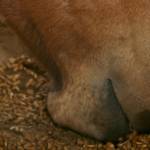Weight Loss in Senior Horses: A Pain in the Mouth?

Studies show* that senior horses have an array of health issues that require recognition and improved management to help keep them as comfortable as possible in their golden years. A generalized decrease of enthusiasm for eating in older horses compared to their younger counterparts combined with some potential sources of chronic pain can potentially lead to weight loss.
“Dental issues are widely believed to contribute to decreased intake because feed is dropped during chewing, or is not chewed adequately, and not physically broken down as well prior to reaching the small and large intestine, among other reasons,” said Kathleen Crandell, Ph.D., an equine nutritionist with Kentucky Equine Research.
According to one study focusing on special senior needs*, 100% of the 69 senior horses examined had dental abnormalities. Poor dentition can make chewing more challenging and puts horses at risk for choke and ulcers.
“Older horses have to chew much more than younger horses to produce the same amount of saliva. Saliva helps horses swallow their food and contains bicarbonate to buffer, or reduce the acidity, of the stomach,” Crandell added.
Dental disease is not the only source of pain for aging equids. Multiple joints and muscles contribute to the process of chewing, one of which is the temporomandibular joint (TMJ)—the hinge joint between the temporal bones of the jaw in front of the ear and the jawbone, known also as the mandible.
Approximately 5-12% of the human population has arthritis of the TMJ and suffers from a clicking jaw, pain, difficulty chewing, and decreased mobility of the joint. In horses, disease of the TMJ is also thought to negatively affect chewing**, though far less is known about TMJ disease in horses than humans.
In their study, Smyth and coworkers discovered that horses with TMJ disease alter the side of the mouth they preferred to chew on, and that the three phases of chewing (opening, closing, and the power stroke) were all markedly different than in horses with healthy TMJs. The authors concluded that some horses with TMJ inflammation had significant discomfort, decreased feed efficiency, and quidding.
Considering that chronic joint pain leading to lameness is common in older horses, it is possible that jaw pain can also negatively impact performance—chewing performance. Speak with your veterinarian and nutritionist about what steps can be taken to help horses with “oral unsoundness.”
*Ireland, J.L., C.M. McGowan, P.D. Clegg, et al. 2012. A survey of health care and disease in geriatric horses aged 30 years or older. The Veterinary Journal. 192:57-64.
**Smyth, T.T., J.L. Carmalt, T.T. Treen, et al. The effect of acute unilateral inflammation of the equine temporomandibular joint on the kinematics of mastication. Equine Veterinary Journal. In press.








